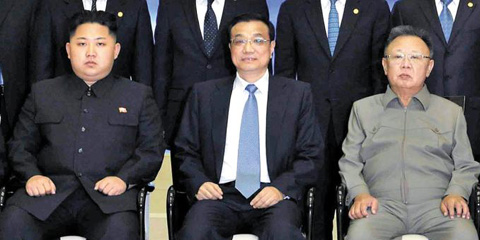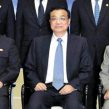
Plenum Document Highlights Broad Role for Social Management; Rising Leaders Meet in Pyongyang
Publication: China Brief Volume: 11 Issue: 20
By:

Plenum Document Highlights Broad Role for Social Management
From October 15 to 18, the Chinese Communist Party (CCP) convened the 6th Plenum of the 17th Central Committee to address China’s evolving cultural milieu. On October 25, the CCP released the resolution entitled “CCP Central Committee on Deepening Reform of the Cultural System: Resolution to Address a Number of Challenges to Promote the Development and Prosperity of Socialist Culture” (Xinhua, October 25). With the succession battle heating up for the 18th Party Congress next year, some observers saw the focus on culture as a way to avoid political horse trading over personnel. The emphasis on the CCP’s role as guiding Chinese socialist and traditional culture, however, suggests a clear endorsement of the guidance work of several Politburo members and highlights the need for observers to evaluate the rising leaders in the propaganda and political-legal systems (“Jockeying for Position Intensifies among Candidates for the Politburo Standing Committee,” China Brief, October 28; Wall Street Journal, October 24; Los Angeles Times, October 18).
Divided into nine sections, the plenum resolution shows the CCP’s awareness that it faces an environmental shift in the nature of Chinese governance—including an international influence—and the party’s determination to control those changes while retaining power (People’s Daily, October 19). Within the overall context of the scientific development concept and socialism with Chinese characteristics, the different sections addressed the development of socialist culture and its value system; the strengthening of cultural industries, such as film and art; and the integration of so-called “social management” tools to guide society and encourage a healthy cultural milieu (Xinhua, October 25).
The resolution explicitly highlighted the importance of modernizing the propaganda apparatus to compete internationally as well as domestically, where the speed of Internet users in transmitting data has undermined the CCP’s ability to be in front of breaking news. To do this, the CCP needs to build coordination mechanisms and complementary coverage across newspapers, journals, television, online and other media outlets, capable of responding quickly and flexibly depending on the tone of public discourse. The document states, “proper public opinion guidance is a blessing for the [CCP] and the people; mistaken public opinion guidance is a disaster for the [CCP] and the people” (Xinhua, October 25). Internationally, Beijing ostensibly is worried about a perceived U.S. public opinion strategy to guide against international opinion against its adversaries, which includes China. A more aggressive and competent Chinese-sponsored propaganda effort is needed to counter this U.S. threat (Red Flag, June 28).
Western observers already have singled out microblogs as a principal target for CCP crackdowns; however, the resolution provides official sanction for a broad spectrum of long-expressed concerns and already extant programs targeting social media (Bloomberg, October 26; Reuters, October 26; The Guardian [UK], October 26). For example, while microblogs, such as Sina Weibo, have received on-and-off attention, following the Wenzhou high-speed train accident in July, official Chinese press coverage of microblogs and their relationship to social stability and “healthy Internet culture” ballooned in August (Xinhua, August 25; Red Flag, August 24). Chinese netizens also have noted increasingly sophisticated censorship techniques—including allowing users to view their own posted messages that are not visible to anyone else—where government and so-called “50 Cent” posters cannot keep discussion within acceptable boundaries.
In addition to shaping the Chinese culture, the resolution also calls for moral responsibility at all levels of society under CCP leadership. This piggybacks a discussion filling the Chinese press and public discourse over the state of public morality in China—most recently, the death of a young girl, Yueyue, who passersby refused to help after a van hit her, leaving her lying in the street bleeding. The resolution noted the CCP imperative to “strengthen public morality, professional ethics, family values and personal moral education” (Xinhua, October 25). One initiative already announced is television programming to teach moral behavior to replace some entertainment programs next year (South China Morning Post, October 26).
The principal beneficiaries of the 6th Plenum are the Politburo members most involved in the various forms of social management. Long-time Propaganda Department Director Liu Yunshan has overseen the dramatic rejuvenation of CCP propaganda from a failing policy of control to a guiding policy that aims to shape public discourse actively [1]. Another likely beneficiary is State Councilor and Minister of Public Security Meng Jianzhu, who has overseen the Ministry of Public Security’s shift toward intelligence-led policing, consolidation of public security informatization and, most recently, the nationwide launch of public security microblogging (“Public Security Officially Joins the Blogosphere,” China Brief, September 30; “China’s Adaptive Approach to the Information Counter-Revolution,” China Brief, June 3). Both Liu and Meng probably will rise to the Politburo Standing Committee, replacing Li Changchun and Zhou Yongkang, respectively.
It can be concluded from the 6th Plenum that under one rubric, the CCP has blessed authoritatively a variety of programs to improve Beijing’s control over an increasingly restless society. Indeed, more than a year ago, Hu Jintao issued a work report—now canonized—on the importance of reforming China’s cultural system as a component of social management and international power (China News Service, July 23, 2010). Looking to future personnel decisions, watching the political gravitas and reputation of who gets placed into social management positions, broadly defined, should provide insight into how the CCP will tackle the shifts in the political and social environment.
Notes:
1. Anne-Marie Brady, Marketing Dictatorship: Propaganda and Thought Work in Contemporary China, Lanham, MD: Rowman and Littlefield, 2008.
Rising Leaders Meet in Pyongyang
From October 23 to 26, Chinese Vice Premier Li Keqiang travelled to North Korea (DPRK) on an official visit. Li, who is widely expected to succeed Wen Jiabao as Premier next year, made one comment that generated substantial media attention. In a meeting with DPRK Prime Minister Choe Yong-rim, Li stated “improving North-South and DPRK-U.S. relations, strengthening dialogue and communication and maintaining peace and stability on the [Korean] peninsula are the common interests of all parties” (Xinhua, October 24). China’s urging of the DPRK to improve diplomatic ties with the United States is a new entry on Beijing’s seemingly growing demand for the DPRK to comply with China and conduct its foreign policy responsibly. Chinese observers have attributed two meanings to Li’s visit, which was followed by a two-day official visit to South Korea. The first is to strengthen China’s relations with the two Koreas; the second is to encourage stability through continued security talks (Fenghuangwang zixun, October 25).
Nevertheless, there remains an overlooked storyline—on October 24 Li met with Kim Jong-Il’s third son, Kim Jong-un, who will almost certainly be his father’s successor (Xinhua, October 25). Very little was reported in Chinese media about Li’s meeting with Kim Jong-un. The meeting between the two up and coming leaders, however, brings to the fore some key questions about China’s future relationship with the DPRK. Beijing appears to have been making an early attempt to form a strong bond with Kim Jong-un. In August, PLA Daily carried an article supporting the launch of Kim Jong-un as heir apparent, it referred to China-DPRK historical ties, saying their bond is “unbreakable” (PLA Daily, August 31).
Earlier this week, North Korean state media reportedly started referring to Kim Jong-un simply as “General,” a move solidifying the young protégé’s status (Chosun Ilbo, October 26). Chinese media previously had reacted to reports Kim Jong-un was to replace front-line military commanders by praising Kim Jong-un’s ability to gain the support of Korean youth and to eliminate “unhealthy tendencies” of party cadres (Xinhua, September 23). However, the article also questioned Kim Jong-un’s distance from economic and foreign affairs matters (Xinhua, September 23). It has been a difficult year for Sino-DPRK relations and economic issues have been at the center of these tensions. For example, during Kim Jong-Il’s trip to China in May, which many analysts labeled a “disaster,” “Kim often wanted to talk aid, while Chinese leaders spoke of economic development” (“Implications of China’s Economic Penetration of North Korea”, China Brief, July 15).
Beijing’s economic ties with the DPRK make the recent tensions appear superficial relative to the bilateral relationship’s status quo. Already, China-DPRK trade has risen 87 percent in 2011 to $3.1 billion (Xinhua, October 19). Although this trade is economically insignificant to Beijing compared to Sino-South Korean trade—projected to reach $250 billion in 2011—it is significant to Pyongyang (www.gov.cn, October 26). According to the Seoul-based Korea Trade-Investment Promotion Agency, in 2010, “China accounted for 83 percent of North Korea’s $4.2 billion of international commerce,” (Bloomberg, May 27). With its food crisis deepening, North Korea finds itself more reliant on Chinese economic assistance. To make matters worse, massive flooding and resulting mudslides late this summer ruined 50,000 acres of North Korean farmland (China Post, August 1).
While Kim Jong-un is assuming a greater leadership role, political decision making is still in the hands of his father (Nanfang Ribao, January 14). At the moment, Kim Jong-un’s political positions are unclear. Therefore, Beijing possibly views supporting Kim Jong-un’s succession as an opportunity to make him beholden to Beijing. While Beijing probably cannot control Kim Jong-Il’s day-to-day policymaking, North Korea’s very existence increasingly relies on China’s assistance. It appears the younger Kim will have little choice but to kowtow to Beijing.
Li made clear in his visit to both North and South Korea this week that strengthening bilateral relations with the South is a priority for China, as are improved DPRK-U.S. relations. Beijing’s seemingly more assertive foreign policy in East Asia over the past few years indicates to some degree the threat Beijing perceives on its periphery—especially as the United States again appears to be re-asserting its presence in East Asia (People’s Daily, October 18; Xinhua, July 21; People’s Daily, November 10, 2010). How Beijing prioritizes its goals for the Korean Peninsula remains unclear. Stability and influence seemingly far outstrip other potential goals, such as nuclear disarmament or reputational gains from pressuring Pyongyang. Regardless, perhaps the real message Li intended to send to the DPRK and Kim Jong-un was that even though Beijing pursues friendly relations with the DPRK, its economic assistance carries a price tag: China has both the ability and the will to exert influence over the DPRK’s behavior.





